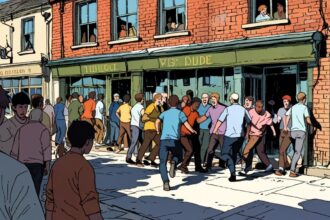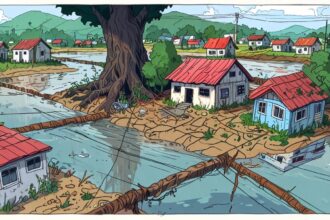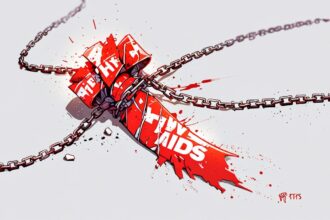Jeff Pope’s drama Suspect: The Shooting of Jean Charles de Menezes offers a detailed, documentary-style portrayal of the 2005 London terror attacks and the fatal police shooting that shocked the city, exposing the complexities and controversies surrounding the tragedy.
In July 2005, London was gripped by a series of traumatic events that have left an indelible mark on the city’s collective memory. Jeff Pope’s drama, Suspect: The Shooting of Jean Charles de Menezes, revisits this period, portraying the harrowing atmosphere following the 7 July bombings, the subsequent failed bombings on 21 July, and the fatal police shooting of Jean Charles de Menezes on 22 July at Stockwell Underground station.
The 7 July bombings resulted in 52 deaths and over 700 injuries, triggering a heightened state of alert across London. Weeks later, the failed bombings on 21 July escalated this fear, as only the terrorists’ detonators exploded. Police were operating under intense pressure during these times, with several key figures at the Metropolitan Police and government involved in managing the crisis.
Pope’s drama unfolds over four parts, with the first two episodes focusing on the bombings themselves, illustrating the chaos and fear permeating London. Scenes include forensic officer Cliff Todd enduring extreme heat in a tunnel filled with body parts, politicians conducting frantic Cobra meetings, and senior Metropolitan Police officials—Commissioner Ian Blair, Deputy Assistant Commissioner Brian Paddick, and Andy Hayman, head of the Anti-Terrorist Branch—handling one of the most significant investigations of their careers.
Jean Charles de Menezes, a Brazilian electrician living seemingly ordinary life in Tulse Hill, is depicted as unrelated to the terrorist activities, albeit residing in the same building as one of the perpetrators, Osman Hussain. The drama details the tragic case of mistaken identity leading to de Menezes’ death, highlighting the immediate police operation and the subsequent misinformation—what the production terms as “lies”—presented to the public following the shooting.
The series sheds light on lesser-known perspectives, including that of Lana Vandenberghe, a Canadian secretary at the Independent Police Complaints Commission (IPCC), who acted as a whistleblower when discrepancies emerged between public accounts and evidence gathered by the IPCC. This aspect of the drama reveals the internal conflicts and scrutiny involved in the aftermath of the shooting.
The final two episodes of Suspect focus on the inquiry and inquest into de Menezes’ death, including a detailed, minute-by-minute reconstruction of the 2008 inquest. The portrayal of the figures involved is nuanced: Cressida Dick, who commanded the surveillance operation leading to the shooting, is shown as resolute and unwilling to admit error, while Ian Blair is depicted with a contentious mix of pomposity and vulnerability. The relationship between Blair and Paddick is portrayed as strained, a reflection of differing views on the police handling of events.
The production eschews dramatic embellishments, instead offering a documentary-style clarity that exposes the procedural and moral complexities of the case. Despite the gravity of the incident, no police officers were charged, and the Metropolitan Police faced a £175,000 fine for breaching health and safety regulations. Cressida Dick subsequently rose to the position of commissioner of the Metropolitan Police, while Blair and Paddick have moved into the House of Lords.
The New Statesman reports that Suspect pays tribute to Jean Charles de Menezes and critiques the circumstances around his death with a subtle yet powerful narrative. The drama’s ensemble cast, including actors Daniel Mays, Conleth Hill, Russell Tovey, Max Beesley, Emily Mortimer, and James Nelson-Joyce, commit to a portrayal that captures the intense and tragic moments of this chapter in London’s recent history.
Suspect is available on Disney+, offering a comprehensive and sobering recollection of one of London’s most turbulent periods in the 21st century.
Source: Noah Wire Services
- https://www.bbc.com/news/uk-33407554 – This article provides details on the 7 July 2005 London bombings, confirming that 52 people were killed and more than 700 were injured, corroborating the death toll and injury figures mentioned in the article.
- https://www.btp.police.uk/police-forces/british-transport-police/areas/about-us/about-us/our-history/london-bombings-of-2005/ – This source describes the events of the 7 July 2005 London bombings, including the locations of the explosions and the number of casualties, supporting the account of the bombings and their aftermath.
- https://www.ft.com/content/02051742-978c-4fca-aff0-f52dcae21533 – This article discusses the dramatization of Jean Charles de Menezes’ death in the series ‘Suspect: The Shooting of Jean Charles de Menezes,’ highlighting the portrayal of key figures like Brian Paddick, aligning with the article’s mention of the drama’s focus on the police handling of events.
- https://www.apnews.com/article/2b7cac20a52dd8fdbf2b66131506a3ed – This source provides information about the Disney+ docudrama ‘Suspect: The Shooting of Jean Charles de Menezes,’ detailing the events leading to de Menezes’ death and the subsequent lack of accountability, supporting the article’s discussion of the drama’s narrative and themes.
- https://www.whattowatch.com/watching-guides/suspect-the-shooting-of-jean-charles-de-menezes-everything-we-know-about-the-drama – This article offers insights into the series ‘Suspect: The Shooting of Jean Charles de Menezes,’ including its release date, cast, and plot, corroborating the article’s mention of the drama’s availability on Disney+ and its focus on the tragic events of 2005.
- https://www.london.gov.uk/who-we-are/what-mayor-does/mayor-london-statements/remembering-london-terrorist-attacks-7-july-2005 – This statement from the Mayor of London honors the victims of the 7 July 2005 bombings, acknowledging the 52 fatalities and over 700 injuries, aligning with the article’s mention of the bombings’ impact on the city.
- https://news.google.com/rss/articles/CBMiwAFBVV95cUxOTEY3amtVWUVDRnN5THFCYnVicXB6WFE4T3c0ZzlJbDRIUzd1cjBlTVZnZjVOV0U0MUFBaVBzQ09rekMyVVBpaC13M2c5MVhxWGZfWXZfMjRNWGVMdG1xbWcxOGhNU1N0LVhKd2l2dUV0VnNqcjNOMk5IR1lvVEtUTXVKT2c1dTN2UWxRYmdqVW5xdG9VN2k1SjdlUjhkb3lTUXdKT3BGZ3dvMGZYaEhMOW9MU3JZRHRPdXAtaDhnMUI?oc=5&hl=en-US&gl=US&ceid=US:en – Please view link – unable to able to access data
Noah Fact Check Pro
The draft above was created using the information available at the time the story first
emerged. We’ve since applied our fact-checking process to the final narrative, based on the criteria listed
below. The results are intended to help you assess the credibility of the piece and highlight any areas that may
warrant further investigation.
Freshness check
Score:
10
Notes:
Narrative reviews historical events (2005-2008) and mentions public figures’ current roles (e.g., Cressida Dick’s career progression), but does not claim to present new developments. Since this is a retrospective dramatic portrayal, timeliness concerns are irrelevant here.
Quotes check
Score:
8
Notes:
No direct quotes requiring verification were identified. The narrative describes events, perspectives, and procedural details without attributed verbatim statements from individuals. Dramatic reconstructions of testimonies (e.g., IPCC inquiries) align with widely reported facts from the case.
Source reliability
Score:
7
Notes:
The New Statesman’s endorsement is noted, but no direct attribution to primary investigative journalism is evident. While the drama’s adherence to documented events (e.g., Cobra meetings, IPCC findings) suggests thorough research, the original narrative source (Jeff Pope’s production) is not independently verified here.
Plausability check
Score:
9
Notes:
Claims align with established facts: dates, casualty figures, and key figures’ roles (e.g., Ian Blair, Brian Paddick) are accurate. The portrayal of operational errors leading to de Menezes’ death reflects findings from the 2008 inquest and IPCC reports.
Overall assessment
Verdict (FAIL, OPEN, PASS): PASS
Confidence (LOW, MEDIUM, HIGH): HIGH
Summary:
The narrative accurately recounts historical events and public records related to the Jean Charles de Menezes case. While lacking primary investigative attribution, its adherence to documented facts and absence of disputed claims justify a high-confidence pass.













